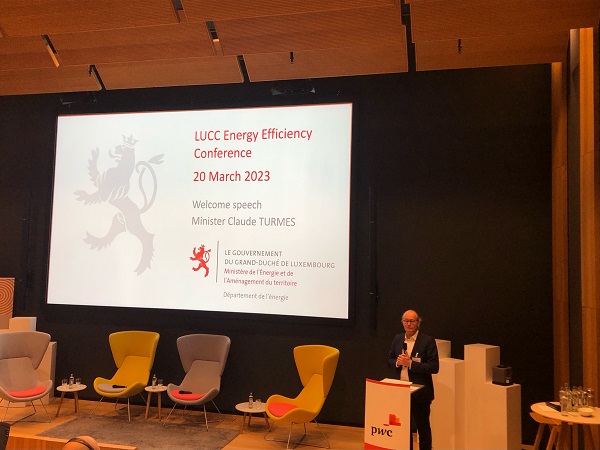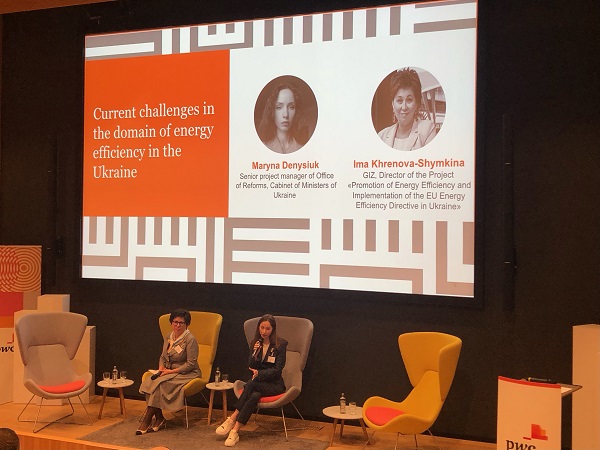 Claude Turmes, Luxembourg’s Minister for Energy and Spatial Planning;
Credit: Otilia Dragan / Chronicle.lu
Claude Turmes, Luxembourg’s Minister for Energy and Spatial Planning;
Credit: Otilia Dragan / Chronicle.lu
On Monday 20 March 2023, the Luxembourg-Ukraine Chamber of Commerce (LUCC; formerly the Ukraine-Luxembourg Business Club) held a conference on "Energy Efficiency in Industry and Agriculture" at PwC Luxembourg, with the support of the Luxembourg Chamber of Commerce.
The conference aimed to create a connection between businesses in Ukraine and Luxembourg to share expertise in energy efficiency and sustainability, focussing in particular on industrial and agricultural applications.
Ukrainian business partners and representants of the Ukrainian Ministries expressed the goal for Ukraine to repair infrastructure destroyed by Russian attacks, using energy efficiency and sustainability as the bedrock of Ukraine’s post-war recovery, to create an opportunity from the destruction and rebuilding process to implement energy-saving measures and sustainable technology.
Participants (about 70 in the morning session) included representatives of Ukrainian and Luxembourg businesses, government officials, representatives of environmental and sustainability organisations, GIZ and the European Investment Bank.
Christopher Collie, Principal Legal Counsel, ESM & Director at LUCC, Philippe Pierre, Partner Public Sector Leader at PwC, and Serge Hanssens, Partner at PwC, delivered the opening address.
The welcome speeches emphasised the importance of energy efficiency as the key driver for competitiveness in Ukraine’s reconstruction. Serge Hanssens pointed out how energy efficiency is a “fundamental element of the future for all countries but especially for Ukraine”.
Claude Turmes, Luxembourg’s Minister for Energy and Spatial Planning, agreed with this claim and shared his feelings of pride at the “broad, almost perfect consensus in policy in the fight for [Ukraine’s] freedom: business freedom, citizens’ freedom.” He added: “We don’t want to live in Putin’s world.” “50% of the story is about energy efficiency,” he stressed, explaining that adapting without it would be impossible. In fact, he considered energy efficiency the only way to prevent an ecological disaster and he named obligatory audits as a crucial tool allowing a 15-25% reduction in energy consumption.
Minister Turmes mentioned the energy efficiency obligation scheme, introduced in the early 2000s which has since been adopted by more than a dozen European countries. He compared scheme to an “arranged marriage between the industry and the energy providers” and added that energy companies also have a responsibility in saving and energy efficiency. He also touched upon how beyond energy efficiency, the new frontier is zero carbon in the industry and defined the current project as adding renewals to energy efficiency politics by means of dedicated auctions and decarbonisation.
Minister Turmes stressed the importance of lowering transaction costs for long-term arrangements between the energy industry and suppliers, giving as an example the Luxembourg-based steel company ArcelorMittal. ArcelorMittal needs a substantial amount of gas in order to reheat the steel before milling it, which could be replaced by biomass combustion – a carbon-free process because the resulting CO2 was previously captured by the plants being combusted. Biomass is a scarce resource in Europe, Minister Turmes said, although he nodded at this perhaps being a possibility in Ukraine. However, in Luxembourg, reaching towards green hydrogen was the next best solution.
Luxembourg being a small country with the highest pro capita demand in energy, comparable to Saudi Arabia, the minister stressed that Luxembourg will be unable to produce more than 40% of the energy needed. The rest would need to be gained from partnerships with other countries – such as Denmark and the recent renewable energy agreement as well as the Ireland project.
Lastly, Minister Turmes said that Europe needs an industrial policy approach and that for a long time, he deplored a lack of action that brought with it “enormous dependency” concerning energy supply.
Claude Radoux, the Honorary Consul of Ukraine in Luxembourg, also gave a welcome speech stressing the importance of energy use in the reconstruction of Ukraine, including strategic measures and choices to be made considering energy dependency and interdependency.
Lyudmyla Tsyganok, Head of Delegation President of the Professional Association of Environmentalists of Ukraine (PAEU), discussed how the PAEU integrates various branches of industry and agriculture, studies and popularises solutions. She stated as a common primary goal the acceleration of decarbonisation and the implementation of best European practices in view of the beginning of effective cooperation and joined projects.
These welcome speeches were followed by a presentation of current challenges in the domain of energy efficiency in the Ukraine, by Maryna Denysiuk (Senior Project Manager of Office of Reforms, Cabinet of Ministers of Ukraine) and Ima Khrenova-Shymkina (GIZ, Director of the Project “Promotion of Energy Efficiency and Implementation of the EU Energy Efficiency Directive in Ukraine”).

The conference continued into the afternoon with more panel discussions and a networking lunch.








